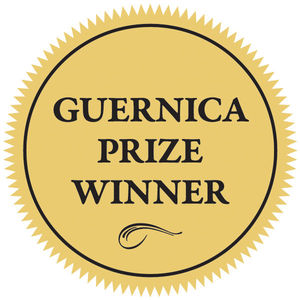How The Guernica Prize Became One of CanLit's Most Unique Literary Awards
For many emerging writers, winning a literary prize is a dream that is perhaps only second is holding a copy of one's own, published book. In Canada, there's a young but exciting prize that offers a two-for-one in that dreams coming true department: the Guernica Prize for Literary Fiction, which not only awards a $1,000 prize to the manuscript selected by the jury as of the highest quality, but also then provides a contract to publish the book in question. Previous winners of the prize include J.A. Wainwright, Theresa Shea, and K.R. Wilson.
Looking for books that fits the acclaimed indie's press's aesthetic of boundary pushing, cutting edge literary fiction, the prize accepts submissions of novels over 40,000 words. Finding the right story amongst the submissions is no easy task though. Anna Van Valkenburg, the Associate Publisher of Guernica Editions, joins us today to talk about the prize, how it came to be, and what Guernica, with a four-decade history of diverse, social justice-focused storytelling, is looking for in a manuscript.
As well, award winning author Danila Botha, who served as a juror for the 2021 Guernica Prize, contributes to fill us in on the experience of being part of the jury for such a unique prize.
And for all the emerging and aspiring writers out there who may be interested to enter, the deadline for this year's contest is just around the corner: April 30, 2022, 11:59 PM.
Open Book:
Tell us a little bit about how and why the Guernica Prize came to be.
Anna Van Valkenburg for Guernica Editions:
Seven years ago, Guernica was looking for a way to increase the awareness of the press among both Canadian readers and authors. We brainstormed several ideas including a prize for a first poetry collection and a prize for multicultural fiction. We already have a successful First Poets series, through which we support and promote books by debut poets, and in the end a more specific theme for the prize felt too restrictive. We simply wanted to find books that were excellent, daring, and supportive of different cultures. Something we already do through our regular imprints. The Guernica Prize ended up providing us with a perfect way to promote our press, and to bring to light the type of books that we love and want to see more of.
The Guernica Prize also allows us to work with independent jurors who judge the manuscripts anonymously, thus creating more objective criteria and a fresh take. In other words, a way to step outside our biases.
OB:
There aren’t a lot of prizes for unpublished novels. Why did you decide to focus on novel-length manuscripts for this prize?
AVV:
We receive several hundred fiction submissions each year during our regular submissions period. Creating a prize for an unpublished novel has allowed us to provide an additional avenue for the various novelists who were already knocking on our door. We also wanted to create a prize that was inclusive and supportive of emerging novelists. Focusing on unpublished manuscripts has allowed us to simply support strong literature and talented writers, whether or not they’ve already been recognised for their work. The winning manuscripts are given as much attention during editing as our First Poets titles.
Since we publish the winning novel, the GP has also provided us with excellent manuscripts for our press.
Your CanLit News
Subscribe to Open Book’s newsletter to get local book events, literary content, writing tips, and more in your inbox
OB:
What are you looking for when you read submissions to the prize? What qualities make a manuscript stand apart?
AVV:
The Guernica Prize is an extension of Guernica’s mission. That means that what we look for in entries is in line with what we look for during our regular submissions. We want to see books that dare to tear down borders and cross boundaries, books that provide a new perspective. Voices that are fresh and self-aware.
That said, we leave all the judging to our jurors. Apart from our broader mission, we don’t give our jurors any other guidelines and they’re the ones who are deciding what constitutes ‘literary excellence’ for the purpose of the prize.
OB:
On the other hand, are there things you see repeated a lot in submissions that authors should be cognizant of?
Danila Botha, 2021 juror:
First of all, I just want to say that all the entries were amazing, and I was honoured to get to read the work of such a talented and varied pool of writers. We debated for days because so many of these books were so, so good.
Something I saw a few times, which seems small, but matters in a contest is formatting. Just the standard stuff that makes something easy to read, double space, size 12 font, Times New Roman or Arial or a font that's easy to read. (I can think of at least one with a very creative font, which definitely made it stand out, but was actually hard to read.)
Also, make sure to follow whatever rules the contest has. In this case, if you're only supposed to put your name on your cover letter, but not your manuscript, make sure you really do that, and that you double check every page. Another small thing, is copy editing. Spell check is such a great tool but as writers we sometimes tend to focus on the big, substantive edits, which are undoubtedly important, but make sure you check the small things too. Before you send it, do a final read of all the small things.
Also, don't worry about what you think anyone will like ––– just write the story you feel excited and compelled to tell. The books we fell in love with are so different from each other, but they all have beautiful writing, strong characterization and voice, thoughtful descriptions and great insights into the human condition. I was so inspired by what I read, and grateful to get to judge. The next round of judges are so lucky to be part of this.
OB:
The winner will get a contract to publish their book with Guernica and join the acclaimed authors in Guernica’s archives. How do you see Guernica’s identity as a press, and how does it fit into the CanLit landscape in your opinion?
AVV:
Guernica has been publishing books ‘on the fringe’ books before it was cool. Naturally, as societal norms and expectations have changed, so did does the definition of ‘on the fringe’. But we’ve been there the whole time, for more than four decades, supporting marginal voices and giving them a spotlight on the CanLit scene. We publish books that reflect our commitment to tearing down borders and creating ties between cultural and social groups. Our main mission is to publish books that address social justice issues, promote peace, build community, and speak to readers on a universal level.
OB:
What do you envision or hope for in regards to the future of the Guernica Prize?
AVV:
The Guernica Prize is still very young. Nevertheless, we’ve received so many incredible submissions and got to publish exceptional books as a result. In the coming years, we hope to find a sponsor for the prize, which would enable us to increase the prize money and continue to expand the reputation of the prize.
_______________________________________________________
For more information about the Guernica Prize and Guernica Editions, please visit their website.






